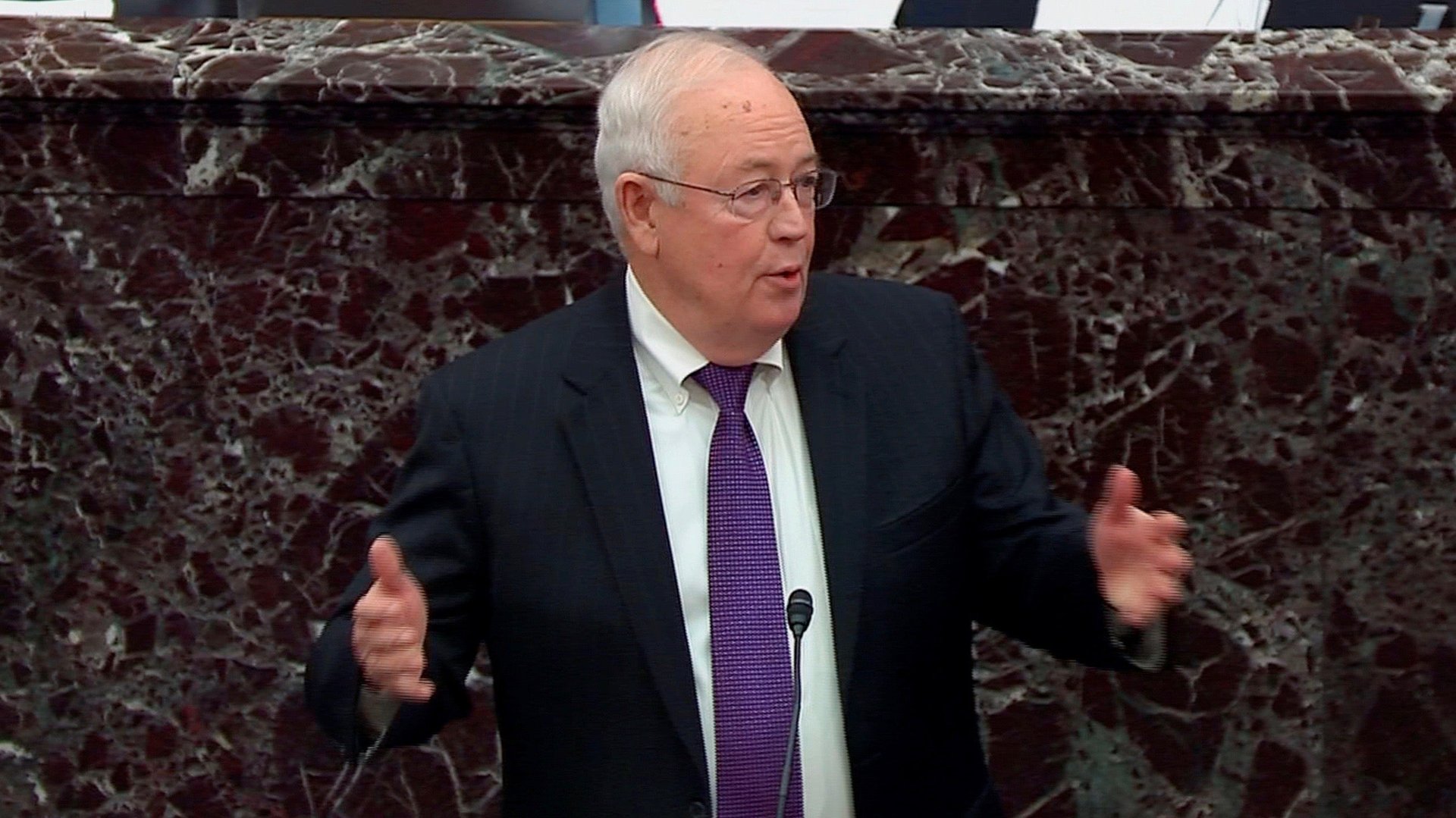Trump defender Ken Starr delivers ironic presentation on the “age of impeachment”
Perhaps you recall Kenneth Starr, circa 1998, of Starr Report fame. He was the independent counsel who investigated Bill Clinton, publishing a salacious investigation that prompted presidential impeachment proceedings. Now he is defending president Donald Trump in his own Senate trial.


Perhaps you recall Kenneth Starr, circa 1998, of Starr Report fame. He was the independent counsel who investigated Bill Clinton, publishing a salacious investigation that prompted presidential impeachment proceedings. Now he is defending president Donald Trump in his own Senate trial.
Yesterday, Starr was the first presenter on the second day of team Trump’s opening statements. He warned about the dangers of this “age of impeachment,” lamenting that in the 21st century “the impeachment habit proved hard to kick.”
Starr asked, “How did we get here?”
The question was of course rhetorical, given his outsized involvement in one of two presidential impeachments in the late 20th century and his presence on the current trial’s defense team. Starr was instrumental in creating this unseemly frenzy that he claims has gripped the nation.
Yet now he calls for a “return to norms,” by which he meant a historical time when presidential impeachments were exceedingly rare.
In his hearkening back, Starr occasionally seemed to refer to some imaginary era that never was, and to nonexistent law. Starr concocted a presidential impeachment test of sorts to determine whether Trump should be convicted, which he “respectfully submitted” to senators. But it was based on a “principle” that’s an opinion, unrelated precedent, interpretations of the Constitution unsupported by history, and by characterizing the president as a protected class of “minority” citizens.
Most notably, Starr claimed only a statutory crime or violation of law qualifies as an impeachable offense—unlike the abuse of power charge against Trump—although that notion was dispensed with in the founding fathers’ early documents.
“Will law professors agree with this?” he asked senators about the position. The former prosecutor answered his own question with the only possible response, saying, “No.”
He added, “But with all due respect to the academy, this is not an academic gathering. We are in court. We’re not just in court. With all due respect to the chief justice and the Supreme Court of the United States, we’re in democracy’s ultimate court.”
His argument, as Starr anticipated, was quickly dismantled by the tweeting academy. Georgetown University Law Center associate dean Joh Mikhail countered with the more commonly accepted view that “some, but not all, impeachable acts are crimes/offenses against the US.”
The rules?
Starr argued that impeachments can only proceed with bipartisan support. He called this invented principle “the Rodino rule.” Peter Rodino was the Democratic House Judiciary Committee chairman during the Nixon impeachment inquiry. Starr pointed to the bipartisan support Rodino enjoyed to show Trump’s impeachment—supported only by Democrats and one Independent in the House—was illegitimate.
Starr ignored the fact that Trump’s alleged offenses are what should concern senators now, not mirroring the Nixon precedent, which in no way dictates all future impeachments. Starr’s former law professor, Walter Dellinger of Duke University law school, rejected the arguments on Twitter for this reason.
The impeachment test recipe Starr proposed included a dash of this and a bit of that. He cited from the unrelated 1971 Supreme Court case Bivens v. Six Unnamed Agents, which allowed plaintiffs to sue government officers for damages in civil suits pursuant to the constitutional right to be free of unreasonable searches and seizures.
From this case, Starr took a discussion of “factors counseling restraint” in the opinion, for his own test. He argued that, here, two such factors, or reasons not to find against Trump would be that the “articles of impeachment don’t charge a crime” and that there is no bipartisan support for Trump’s removal. But Bivens isn’t on point and the citation was a distraction.
Similarly, Starr suggested that Trump was persecuted unjustly and deprived of the most basic trial rights, although a constitutional process like impeachment is not a criminal proceeding (if it was, the Republican senators serving as judges and jurors wouldn’t be schmoozing with the defense team on trial breaks, among other stark distinctions).
The icing on this ironic cake
Finally, Starr trotted out arguments designed to pull on American heartstrings if not to pass constitutional muster. “I need not remind this high court that in this country minority rights are important. Minority rights should be protected. Equal justice,” he said in Trump’s defense.
The argument was clever but disingenuous. There are “protected classes” in the law, based on a history of discrimination, and it is true that there aren’t very many presidents. But that doesn’t make Trump a minority in the legal sense. He’s the executive, which is nothing like being a member of a group that’s traditionally been disenfranchised based on race, age, sex, religion, or national origins, say.
Doubling down on the deliberately confusing rhetoric, Starr recalled the first presidential impeachment trial of Andrew Johnson in 1868. “The president [was] denied the basic rights that have been afforded to every single accused president in the history of the republic, even to the racist Andrew Johnson seeking to undo Mr. Lincoln’s great legacy. He got those rights. But not here.”
Starr’s ironic and legally questionable take was offered as an “exit ramp” to senators worried about seeming to voters like they are ignoring Trump’s alleged constitutional violations. Starr explained, “Members of this body full-well understand that a presidential impeachment is tantamount to domestic war albeit thankfully, protected by our beloved first amendment, a war of words and a war of ideas. But it’s filled with acrimony and it divides the country like nothing else. Those of us who lived through the Clinton impeachment understand that at a deep and personal way.”